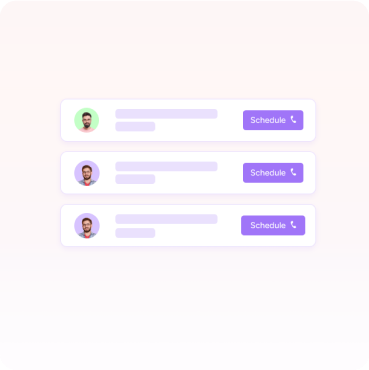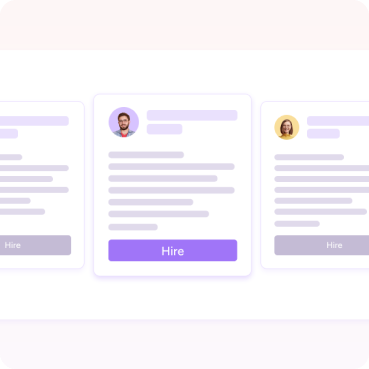Regular hiring
High RiskHire Node JS Developers of Silicon Valley caliber
Hire pre-vetted full time remote Node JS Developers from India. Hire now and build your dream engineering team with Hyno
Join 4,000+ companies already growing








Our Top Remote Developers
Hyno conducts rigorous testing and carefully vets the developers who are fueled by passion and skill sets. Hence, our developer community is the foundation for innovation and collaboration, bringing ideas and projects to fruition.
OUR STANDARDS
Hyno vs. Your regular recruitment process.
Find a risk-free, pre-interviewed, high-quality developer who is remote-ready in less than 2 weeks at 40% less cost.
Parameters
Choose the right for your firm.Time
Fees
Quality
Pre Screening
Remote readiness check
Termination
Failure rate
1 - 4 Months
> $1000
High
Low
Freelancing
High Risk1 - 2 Months
No fee
No
Very high
 Low Risk
Low Risk
0 - 15 Days
No fee
No
Very low
Pricing Starts from $35/hr
Accomplishing everything in just 3 steps
Our technical manager aligns the required skillset and tech stack with our talent pool to help you find the best fit.

Shortlisting candidates
Precise Hiring: Understanding, Gathering, and Shortlisting nittygritty.
-
 We start by thoroughly understanding your unique needs and specifications.
We start by thoroughly understanding your unique needs and specifications.
-
 check markWe
align the developer details with company goals. This way, we tailor the candidate
selection to seamlessly integrate with the organization’s vision and goals.
check markWe
align the developer details with company goals. This way, we tailor the candidate
selection to seamlessly integrate with the organization’s vision and goals.


Scheduling an Interview
Effortless talent selection: Finding your perfect match
-
 We connect you with the chosen candidates to ensure a personalized experience.
We connect you with the chosen candidates to ensure a personalized experience.
-
 Our rigorous
selection process guarantees that you find candidates who align seamlessly with your
requirements.
Our rigorous
selection process guarantees that you find candidates who align seamlessly with your
requirements.


Onboarding the talent
Streamlined onboarding for peak performance.
-
 The selected/qualified talent integrates smoothly through structured onboarding to
quickly adapt to projects, processes, and team dynamics.
The selected/qualified talent integrates smoothly through structured onboarding to
quickly adapt to projects, processes, and team dynamics.
-
 We go beyond
integration to offer ongoing support for a seamless transition to ensure that the
new talent exceeds your expectations.
We go beyond
integration to offer ongoing support for a seamless transition to ensure that the
new talent exceeds your expectations.


Read hiring guide
A one-stop shop to hiring the right Node JS Developer
How to hire a Node JS Developer? Skills to look for, interview questions, and more
Hiring a dedicated developer for your business can
be a cumbersome task. As many companies are competing to hire top Node JS
Developer, so
finding a good developer is not as easy as it may seem.
We're here to assist all employers who choose to hire Node JS Developer on their
own. Recruiting a developer on your own requires a fair amount of software
development experience in general. However, if you're a non-technical manager
interested in learning more about how to hire a Node JS Developer, we've put up
an excellent resource for you.
Things to check Key Skills Required for a Node JS Developer?
The following are the key skills that a developer should possess to become proficient in Node JS:
1. Proficiency in JavaScript: Node.js is built on top of JavaScript, so a strong understanding of JavaScript is essential.
2. Knowledge of Node.js framework and libraries: Candidates should be proficient in Node.js framework and libraries, including Express.js, Socket.io, and others.
3. Experience with database technologies: Candidates should have experience with database technologies such as MongoDB, MySQL, or PostgreSQL.
4. Understanding of RESTful APIs: Candidates should have a solid understanding of RESTful APIs and how to design and implement them.
5. Familiarity with server-side templating languages: Candidates should be familiar with server-side templating languages such as Handlebars and Pug.
6. Knowledge of version control: Candidates should be proficient in version control systems like Git and understand how to manage code repositories.
7. Experience with testing and debugging: Candidates should be familiar with testing frameworks such as Mocha and Chai and be able to debug code using tools like Node.js Inspector.
8. Ability to write clean, maintainable, and efficient code: Candidates should be able to write code that is easy to understand, maintain, and scalable.
9. Knowledge of web application security: Candidates should have an understanding of web application security best practices and how to implement them in Node.js
10. Familiarity with front-end technologies: While not essential, knowledge of front-end technologies such as React, Vue.js, or Angular can be beneficial.
Ideal Hiring Process for Node JS Developer
1. Define the job requirements: Clearly define the job requirements, including the skills, experience, and qualifications necessary for the role.
2. Source candidates: Source candidates through various channels, such as online job boards, social media, and networking.
3. Screen resumes: Screen resumes to identify candidates who meet the job requirements and have the necessary experience.
4. Conduct initial interviews: Conduct initial interviews to assess candidates' technical skills, experience, and fit for the role. This can be done through phone or video interviews.
5. Technical assessment: Conduct a technical assessment to evaluate candidates' proficiency in Node.js, including their ability to write clean and efficient code, troubleshoot issues, and work with Node.js frameworks.
6. Review code samples: Review candidates' code samples to assess their coding skills and quality of their code.
7. Check references: Check references to validate candidates' experience and skills.
8. Final interviews: Conduct final interviews with top candidates to evaluate their communication skills, problem-solving abilities, and overall fit for the role and the company culture.
9. Offer: Extend an offer to the top candidate, including compensation, benefits, and any other relevant details.
10. Onboarding: Once the offer is accepted, onboard the new hire by providing them with the necessary tools, resources, and training to be successful in their role.
Important Interview questions to ask to Hire a Node JS Developer
What experience do you have with Node.js?
I have been working with Node.js for X years, and have developed several web applications using it. I am comfortable with both front-end and back-end development using Node.js, and have worked with various frameworks such as Express.js, Koa.js, etc.
Can you explain the difference between callback and promises in Node.js?
Callbacks are functions that are passed as arguments to another function and are called once that function completes its task. Promises, on the other hand, are used for asynchronous programming and represent a value that may not be available yet but will be resolved at some point in the future. They allow for better error handling and are easier to read and maintain.
How do you manage dependencies in Node.js?
I use the Node Package Manager (npm) to manage dependencies in my Node.js projects. It allows me to easily install, update and remove packages, and also helps in resolving dependencies between packages.
Can you explain the event-driven architecture of Node.js?
Node.js uses an event-driven architecture, which means that the server responds to requests and events in a non-blocking way. When a request is received, an event is emitted and the server continues to process other requests while waiting for the response. When the response is ready, another event is emitted, and the response is sent back to the client.
How do you handle errors in Node.js?
In Node.js, errors can be handled using try-catch blocks, callbacks, or promises. I usually use try-catch blocks for synchronous code and callbacks or promises for asynchronous code. Additionally, I log errors to a file or a database for later analysis.
Can you explain the concept of middleware in Express.js?
Middleware is a function that has access to the request and response objects and can modify them as needed. In Express.js, middleware can be used for tasks such as logging, authentication, error handling, etc. Middleware can be added globally to the application or locally to specific routes.
Have you worked with any database systems in Node.js? Which one do you prefer?
Yes, I have worked with several databases in Node.js such as MongoDB, MySQL, PostgreSQL, etc. I prefer MongoDB because of its flexibility, scalability, and ease of use.
How do you handle sessions in Node.js?
Sessions can be handled using various packages in Node.js such as Express-session, Passport, etc. I usually use Express-session for session management. It allows me to store session data on the server and use a session ID to identify the client. Additionally, I set a session timeout to expire inactive sessions.
Have you worked with any testing frameworks in Node.js?
Yes, I have worked with several testing frameworks such as Mocha, Chai, Jest, etc. I prefer Mocha and Chai because of their simplicity and ease of use.
Can you explain the concept of streams in Node.js?
Streams are a way to handle large amounts of data in Node.js without buffering the entire data into memory. Streams can be read or written in chunks and can be piped from one stream to another. Streams are used for tasks such as reading and writing files, processing network requests, etc.
Job Description Template for Node JS Developer
Location: [Insert Location]
Job Title: Node JS Developer
Position Type: Full-Time
Salary: [Insert Salary Range]
We are seeking a skilled Node.js Developer to join our team. As a Node.js Developer, you will be responsible for developing and maintaining web applications using Node.js, Express.js, and other related frameworks. You will also be responsible for designing and implementing RESTful APIs, integrating with databases, and deploying and scaling applications to cloud services.
Key Responsibilities:
- Develop and maintain web applications using Node.js, Express.js, and other related frameworks
- Design and implement RESTful APIs for the application
- Integrate applications with databases such as MySQL, MongoDB, etc.
- Write unit tests and automated tests to ensure the quality of the code
- Deploy and scale applications to cloud services such as AWS, Azure, etc.
- Collaborate with cross-functional teams including product managers, designers, and other developers to build high-quality applications
- Participate in code reviews and contribute to the development of coding standards and best practices
- Stay up-to-date with the latest trends and technologies in Node.js development
Requirements:
- 3+ years of experience in Node.js development
- Experience with Express.js and other related frameworks
- Proficient in JavaScript and its related technologies such as ES6, TypeScript, etc.
- Experience in designing and implementing RESTful APIs
- Experience with databases such as MySQL, MongoDB, etc.
- Experience with cloud services such as AWS, Azure, etc.
- Knowledge of Git and other version control systems
- Strong problem-solving and analytical skills
- Good communication and collaboration skills
- Ability to work in a fast-paced and dynamic environment
- Bachelor’s degree in Computer Science or related field
If you are a talented Node.js Developer who is passionate about developing high-quality web applications, we encourage you to apply for this exciting opportunity. We offer competitive compensation, benefits, and a great working environment that fosters creativity and innovation.